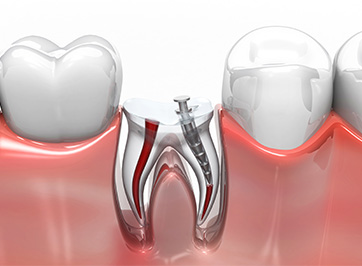
Root Canal Procedure
A root canal is a procedure that is used to save or repair a damage tooth. Whether the tooth has become badly infected or decayed, a root canal can prevent further infection and the formation of an abscess.
During a root canal, we remove the nerve and pulp from the tooth. Then, we clean out the inside of the tooth and seal it. Once the tooth pops through the gums, the nerve of the tooth is no longer essential to the health or function of the teeth, but rather it provides the tooth’s sensations. We can remove the nerve without altering the function of the tooth.
We need to remove the nerve tissue and/or pulp of the tooth if it becomes damaged. This can cause bacteria to multiply, which can then cause an infection or abscess. The damage can occur from severe decay, repeated dental procedures on the same tooth, chips or cracks, large fillings or face trauma.
What To Expect Next
The root canal procedure is often very straightforward, but can sometimes require more than one office visit. After an X-ray to determine the extent of the issue, we will apply local anesthesia to numb the tooth and surrounding area. A rubber dam will help us keep the area dry during the procedure. We will then drill a tiny hole into the tooth in order to remove the nerve and pulp, as well as any bacteria or debris. We use a series of root canal files of varying diameter in order to reach the entire length of the tooth to adequately clean and flush away the debris.
After we have properly cleaned out the tooth, we will seal it. This may happen right away, or at a follow-up appointment. If we have found infection, it can be helpful to use a medication inside the tooth to clear it up, and then seal it once the infection is healed. We will place a temporary crown over the tooth to prevent any contaminants from entering the tooth before it is sealed.
What Happens When A Root Canal Is Done
When the tooth is sealed, a sealer paste is used to full the interior of the tooth, and then a filling is placed in the hole we used to access the inside of the tooth. Your tooth will be sensitive for the first few days after the procedure. An over-the-counter medication can help relieve any discomfort.
A permanent filling or crown will complete your root canal treatment. Continue to brush and floss as normal, and maintain all visits with your dentist as usual.
Root canals are highly successful and can ensure your tooth lasts a lifetime. Root canals can prevent an infection from spreading and causing serious issues, and even resulting in tooth loss.
